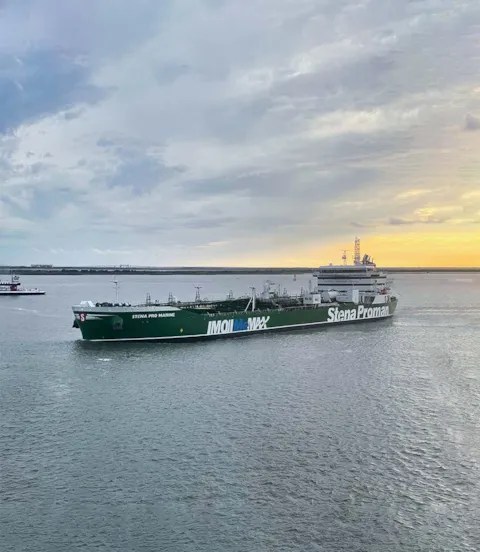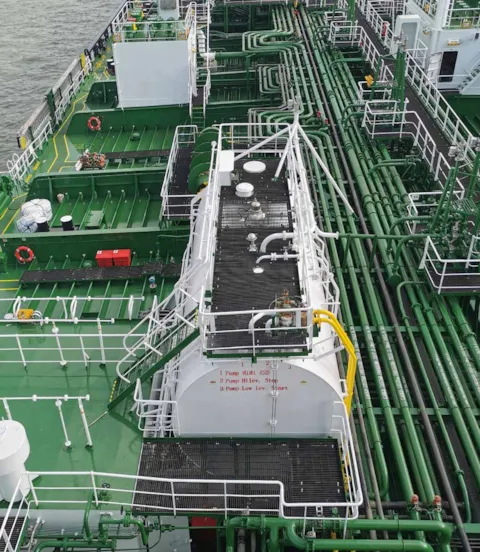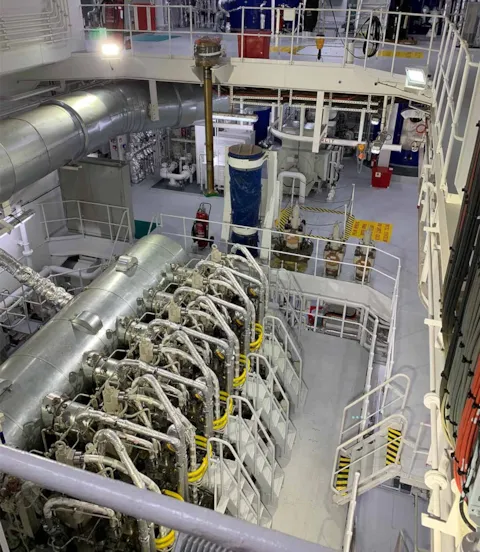Taking methanol propulsion for MR tankers to the next level
Proman Stena Bulk is a joint venture between a methanol producer and a tanker operator. Its purpose is to build and operate the most efficient methanol-fuelled tanker fleet in the market with a smooth transition path towards net zero, and demonstrate the feasibility of methanol as a decarbonization option.
As the shipping industry ponders its options to reach net zero by 2050, methanol as a marine fuel is attracting attention due to the relatively mature and easy-to-adapt technology that is needed and an evolved regulatory framework in place. Furthermore, to remain compliant with tightening carbon emission limits, a methanol-fuelled ship will be able to blend in appropriate amounts of blue or green methanol when required without needing any technical modifications.
Christos Chryssakis, Business Development Manager at DNV, sees the comparatively low capital investment as an especially attractive aspect of methanol as an alternative fuel: “The cost of building a vessel is lower, the whole design is simpler, and the fuel is easier to handle than for example LNG, ammonia or hydrogen. We believe that methanol opens a very promising pathway into a carbon-neutral future.” The question it all hinges on is the future availability of blue and green methanol, he adds.

Proman and Stena Bulk aim to prove methanol as a sustainable fuel
But the industry is not sitting idle. In 2015 ferry operator Stena Line, a subsidiary of Gothenburg-based Stena AB, converted one of their RoPax ferries to methanol in a pilot project to explore the feasibility of this technology. It was the first engine conversion to methanol performed by Wärtsilä. The ferry has been able to operate on methanol since then, demonstrating the maturity of the technology.
Meanwhile the Swiss-based company Proman, a leading producer of methanol and ammonia, was looking for a shipping partner interested in taking methanol propulsion to the next level. “We want to drive the sustainability of all our operations as far as possible,” explains Peter Schild, Managing Director Sustainability at Proman. “Creating a fleet of dual-fuel tankers was part of that concept. Since shipping is not our core competency, we found an ideal partner in Stena Bulk, a tanker operator and a pioneer in methanol-fuelled ship operation.”

Six methanol-fuelled tankers to operate worldwide
The two companies established a joint venture called Proman Stena Bulk and ordered six methanol-ready, 49,900 DWT medium-range (MR) chemical tankers, each with a cargo capacity of about 54,000 cubic metres. Four of the ships have been delivered already and the remaining two are due for completion in late 2023 or early 2024.
The vessels travel from Proman’s methanol hubs in Trinidad, Texas and Oman to the Far East and Europe. “The size of these vessels is ideal for large-volume transport to China,” says Erik Hånell, CEO of Stena Bulk. “They often operate on a multi-stop route taking methanol to China, then other chemical products to Europe before returning to the hub.” Stena Teknik is in charge of the technical and operational management while Proman handles commercial management. “What could be better than a ship owner with our experience cooperating with a methanol producer – it makes a lot of economic sense,” says Hånell.

Class partnership based on common innovation mindset on methanol
All six vessels are built to DNV class, an acknowledgement of DNV’s leading position in the field of methanol technology: the world’s first methanol-ready tanker was built in 2016 to DNV class, and 18 of the current global methanol tanker fleet of 24 vessels are DNV-classified. Jacob Norrby, Head of Newbuilds and Projects at Stena Teknik, says another reason DNV was chosen for this project was a certain affinity between the companies: “We find DNV having a similar mindset to ours with regards to innovation and exploring cutting-edge technologies.” DNV also engages with its clients actively to understand their needs, Norrby adds. “That is a very good starting point for building a strong relationship.”
Stena enjoys the good dialogue with DNV's headquarters in Høvik and with DNV Maritime in Sweden, says Norrby. “The initial discussions with DNV to explore valuable know-how were very beneficial, helping us address the right questions. During the plan approval process it was crucial to have skilled people available at DNV who can give answers swiftly. This sort of collaboration is very meaningful to us, and we appreciate it very much.”

Design properties enable world-leading EEDI
The Proman Stena Bulk newbuilds feature a range of finely tuned design properties, such as hydrodynamic optimization, energy-saving devices, a shaft generator and a highly efficient electrical system, resulting in a world-leading EEDI that is seven per cent better than any other existing medium-range newbuild, says Norrby. “This is really an achievement because it means we need less energy. I believe we have introduced a new standard with these ships.” Furthermore, he adds, Stena is always looking at ways to harness more waste energy from the main engine using the boiler and heat exchangers. “We have introduced another waste heat recovery stage on the scavenging air cooler which brings out a few per cent extra.”
The methanol combustion process requires adding about three to five per cent of MGO as pilot fuel and the ships could in theory operate on MGO alone if running out of methanol, says Norrby. “But our ships run on methanol practically the entire time,” he adds. The injection water used for NOx reduction is produced on board from sea water.

Risk-assessed bunkering process for methanol
Stena has long-standing experience with bunkering methanol and the associated risk control, says Norrby. “With a bunkering procedure in place that has been approved and risk-assessed, the risks are lower than with conventional bunkering. Currently that is the information I have seen working on a bunkering standard for Methanol. We are participating in that.”

Green shipping corridors
Meanwhile a new vision has emerged in the industry: establishing “green shipping corridors” where many stakeholders collaborate to pilot zero-emission fuels and technologies along specific routes. “We are actively involved in the discussions around establishing such collaborative platforms,” says Peter Schild. “We are talking to ports of interest about the most attractive potential routes for owners who have ordered methanol ships. We are involved in talks about a green corridor along the western European shorelines and between Europe and Asia. The key to realizing this concept is a clear regulatory framework, which has yet to be established. And of course, any true ‘green corridor’ would require the availability of sufficient quantities of green methanol.”

The big question: Availability of green methanol
There are clear signs in the market that the famous chicken-and-egg dilemma – the supply and the demand side each waiting for the other to take the first step – is nearing a resolution, says Erik Hånell: “We can see other owners ordering methanol-propelled containerships, and I believe the demand for green methanol will encourage the supply side to deliver. Of course, price-setting will play a major role, but that is something that has to be dealt with.”
Proman is actively investigating ways to procure suitable sustainable organic material from which to produce green methanol. In fact, Proman is currently building a bio-methanol plant in Canada which is scheduled to commence operations in 2025, says Peter Schild. “The plant will have an annual production capacity of 100,000 tonnes of methanol from biowaste but will also process non-recyclable waste using gasification. It will be connected to an 87 MW electrolysis plant to make optimum use of local hydropower and optimize production.”

Various blending options enable the transition to net zero
Proman is also looking into blending methanol from various grey, blue and green sources to gradually lower the fossil carbon emissions along the IMO trajectory towards net zero, says Schild. “A regulatory solution for certifying low-carbon ship fuel blends for the transition period would help tremendously.” A new EU initiative aims to count any fossil fuel as plainly fossil, independent of any carbon abatement measures taken. “This would severely interfere with the willingness of the industry to invest in blue technology, which has a vital role while green volumes are ramping up,” Schild points out. “Nevertheless, we firmly believe that methanol is one of the most attractive alternative fuels for shipping, and backed by Stena’s experience, we want to show the market what is possible.”
- Stena Rederi
- Stena Bulk
- Proman